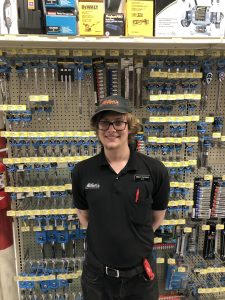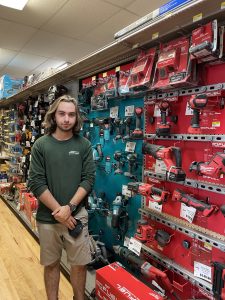Understanding your entire customer base is an important aspect of a successful business, as is understanding your employees. Hardware Retailing spoke with two members of Gen Z, Brandon Packer, an associate at Miller’s Hardware in Spokane, Washington, and Gerry Newenhof, an associate at City Lumber in Astoria, Oregon, to gain insight into how members of Gen Z behave as consumers and employees.
Hardware Retailing (HR): Tell me about your background. How did you get involved with the business?

Brandon Packer (BP): I originally intended to only work at Miller’s Hardware during the summers in between college. It quickly became a job that I hold very dear to me, so I began researching and studying products to build my knowledge and be a more effective employee on the salesfloor. I’ve now been here for over three years, and I’m finding that the learning will never end, which is extremely appealing to me.
Gerry Newenhof (GN): I’m the son of the current owner, and my grandfather purchased the store around 50 years ago, so this industry is in my blood. I’ve been officially working here since 2019, and since then, I have been doing everything I can to learn the business and expand my knowledge base. I’ve become more confident as I have learned different aspects of the business, and I have really grown to love it. I want this to be my future; I can’t imagine doing anything else with my life.
HR: What does customer service mean to you?
BP: If there was a hierarchy of needs for retail, I would imagine customer service would be right below having products to sell. For me, customer service primarily encompasses the knowledge of the product, respect for the customer and skill at matching products to customers’ specific needs.
GN: I think the most important aspect of customer service is making sure customers purchase everything they need on their first trip to the store. Succeeding in this means return trips are unnecessary, which makes the experience more effortless and enjoyable. Getting it right the first time builds trust and makes it more likely that they will be a return customer.
HR: How do you think your generation’s thoughts on customer service differ from older generations?
BP: I think my customer service style may be a bit less formal than some of the older generations may be used to, but my customer service style was mostly instilled in me by the members of our community and old school hardware store tradition.
GN: I think where older generations’ customer service knowledge and style come from experience and time, younger generations’ knowledge comes from the internet and technology. Neither is right or wrong, it is just a different way of getting there. Overall, I think they are pretty similar.
HR: Where do you see customer service going in the future?
BP: Hopefully everything will be fully automated at independent stores, which will allow us to have lower prices. Customers seem to generally have less money and are more enticed by lower prices. However, good customer service seems to be the great divider between independent stores and big-box stores. As long as that divide exists, customer service will have its place in the retail industry.

GN: I don’t think it will change all that much. A lot of people think artificial intelligence will take over the world, but it can’t do everything. Yes, I think the use of technology will increase and will make some things go faster and easier, but that personal element of customer service will remain.
HR: What are some issues that Gen Z employees deal with, and what are your tips for dealing with these problems?
BP: I think that some Gen Z employees struggle with customers making assumptions about their potential lack of knowledge or care. The best way to combat these assumptions is by remaining confident, admitting when you don’t know something and doing your research to make sure you know what you are talking about. Getting headstrong does not get you anywhere.
GN: I think when we look young or have unique aspects of our appearance, like long hair, some customers are less likely to approach us and ask for help. Whether that is because we may not seem knowledgeable or something else, my best advice would be to don’t take it personally, and use your free time to learn so when you are asked a question, you will be able to help.
HR: What draws you to a store?
BP: Evidence that care is being put into the place. Seeing that people are putting effort into a business, whether it be their food, customer service, product selection or cool monthly sales, makes me want to shop there more often than not. Also, word of mouth seems to be some of the best advertising; I find myself telling people to go to stores where I’ve had excellent customer service. I believe that building employee-customer relationships is key.
GN: For me, and I think a lot of Gen Zers, a couple of different aspects draw me to a store. Advertising is important and not just online. Having pamphlets or coupons available at local schools or young hangout spots can be impactful. Additionally, an attractive storefront that showcases the products you sell is important, even better if the store has a funny or memorable name. Lastly, a nice, modern-looking website that is informational and displays what products a business sells or services it offers makes me more likely to visit a store because it allows me to know if they have what I need.
About Miller’s Hardware
Miller’s Hardware was opened in 1951 by brothers Bill and Les Miller in Spokane, Washington. The 3,500-square-foot store serves mostly local DIYers, though its contractor base has grown since new ownership in 2020. The operation’s top categories include plumbing and lawn and garden. Learn more here.
About City Lumber
City Lumber is Oregon’s oldest lumberyard and was started in 1904 as City Lumber and Box Company by Astoria Box Co., Clatsop Mill Co. and Tongue Point Lumber Co. as a way of selling and distributing lumber and boxes to Astoria’s fishing industry. Later the company was renamed City Lumber and Coal, and then it became known as City Lumber and Supply until 1956, when it became City Lumber Company. The 6000-square-foot store serves a customer base of 55% contractors and 45% DIYers. Its top categories include paint, plumbing, plywood and lumber. Learn more here.
 Hardware Retailing The Industry's Source for Insights and Information
Hardware Retailing The Industry's Source for Insights and Information








